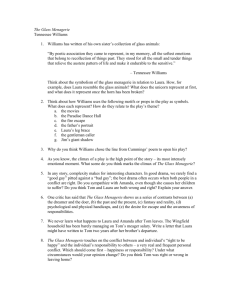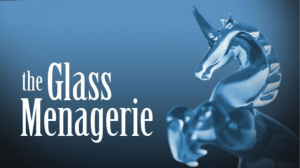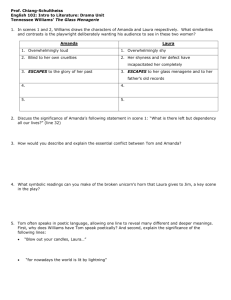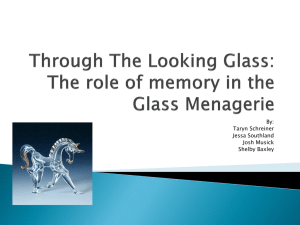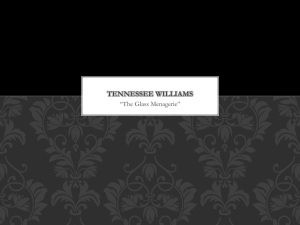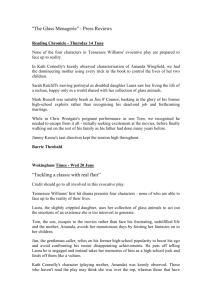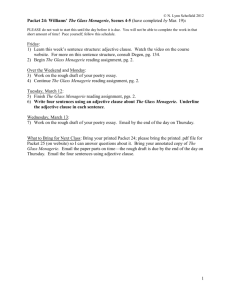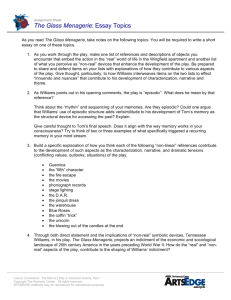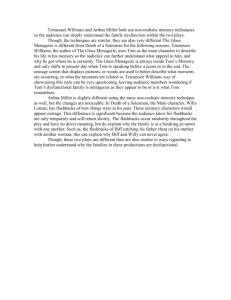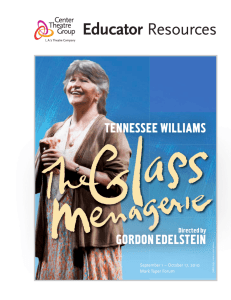MenagerieBigIdeas
advertisement
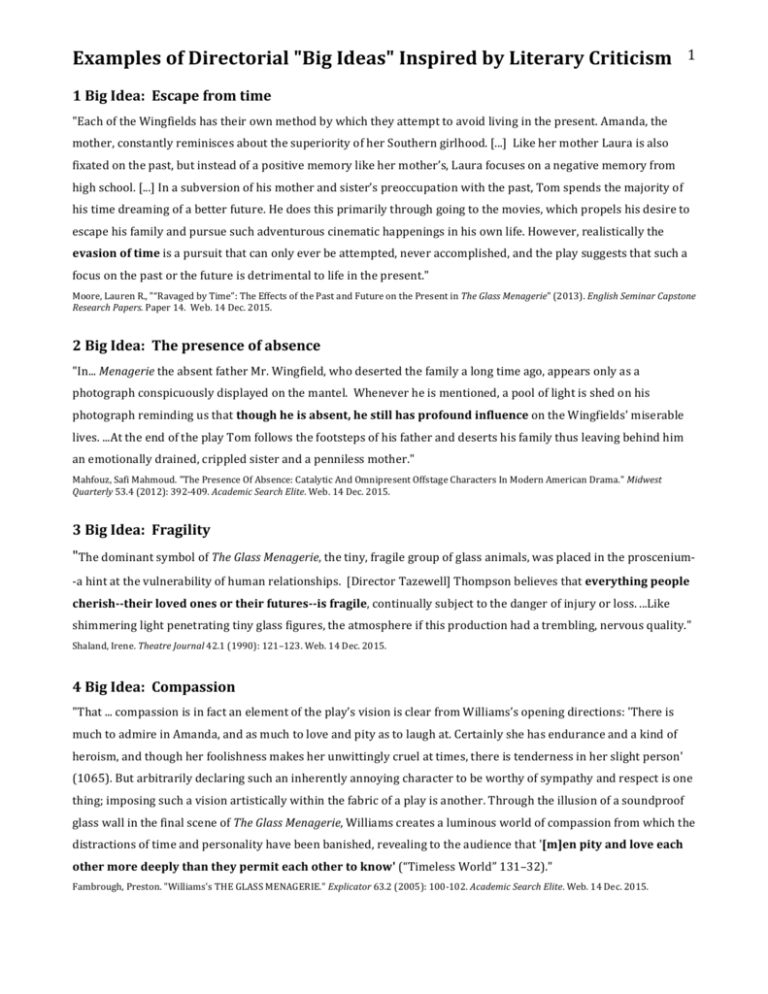
Examples of Directorial "Big Ideas" Inspired by Literary Criticism 1 1 Big Idea: Escape from time "Each of the Wingfields has their own method by which they attempt to avoid living in the present. Amanda, the mother, constantly reminisces about the superiority of her Southern girlhood. [...] Like her mother Laura is also fixated on the past, but instead of a positive memory like her mother’s, Laura focuses on a negative memory from high school. [...] In a subversion of his mother and sister’s preoccupation with the past, Tom spends the majority of his time dreaming of a better future. He does this primarily through going to the movies, which propels his desire to escape his family and pursue such adventurous cinematic happenings in his own life. However, realistically the evasion of time is a pursuit that can only ever be attempted, never accomplished, and the play suggests that such a focus on the past or the future is detrimental to life in the present." Moore, Lauren R., "“Ravaged by Time”: The Effects of the Past and Future on the Present in The Glass Menagerie" (2013). English Seminar Capstone Research Papers. Paper 14. Web. 14 Dec. 2015. 2 Big Idea: The presence of absence "In... Menagerie the absent father Mr. Wingfield, who deserted the family a long time ago, appears only as a photograph conspicuously displayed on the mantel. Whenever he is mentioned, a pool of light is shed on his photograph reminding us that though he is absent, he still has profound influence on the Wingfields' miserable lives. ...At the end of the play Tom follows the footsteps of his father and deserts his family thus leaving behind him an emotionally drained, crippled sister and a penniless mother." Mahfouz, Safi Mahmoud. "The Presence Of Absence: Catalytic And Omnipresent Offstage Characters In Modern American Drama." Midwest Quarterly 53.4 (2012): 392-­‐409. Academic Search Elite. Web. 14 Dec. 2015. 3 Big Idea: Fragility "The dominant symbol of The Glass Menagerie, the tiny, fragile group of glass animals, was placed in the proscenium-­‐ -­‐a hint at the vulnerability of human relationships. [Director Tazewell] Thompson believes that everything people cherish-­‐-­‐their loved ones or their futures-­‐-­‐is fragile, continually subject to the danger of injury or loss. ...Like shimmering light penetrating tiny glass figures, the atmosphere if this production had a trembling, nervous quality." Shaland, Irene. Theatre Journal 42.1 (1990): 121–123. Web. 14 Dec. 2015. 4 Big Idea: Compassion "That ... compassion is in fact an element of the play’s vision is clear from Williams’s opening directions: 'There is much to admire in Amanda, and as much to love and pity as to laugh at. Certainly she has endurance and a kind of heroism, and though her foolishness makes her unwittingly cruel at times, there is tenderness in her slight person' (1065). But arbitrarily declaring such an inherently annoying character to be worthy of sympathy and respect is one thing; imposing such a vision artistically within the fabric of a play is another. Through the illusion of a soundproof glass wall in the final scene of The Glass Menagerie, Williams creates a luminous world of compassion from which the distractions of time and personality have been banished, revealing to the audience that '[m]en pity and love each other more deeply than they permit each other to know' (“Timeless World” 131–32)." Fambrough, Preston. "Williams's THE GLASS MENAGERIE." Explicator 63.2 (2005): 100-­‐102. Academic Search Elite. Web. 14 Dec. 2015. Examples of Directorial "Big Ideas" Inspired by Literary Criticism 2 5 Big Idea: The magician of memory "[I]n scene 4...Tom [ ] describes with great excitement his evening at the movie house, which included a postcinema attraction, Malvolio the Magician. Just as the magician requires his stock devices to create illusions that seem to be real, so Williams uses devices to show that Tom and his family can no longer differentiate between what is real and what is only fantasy. The broken lives are seemingly mended; but just as we know that what the magician has created is not reality, so we know that nothing in this play is founded on reality. Amanda, Laura, and Tom live in every moment but the present, locked into vain memories of past days or hoping for a future beyond the moon and stars of earthbound desires." Thierfelder III, W.R. "Williams's The Glass Menagerie." Explicator 48.4 (1990): 284. Academic Search Elite. Web. 14 Dec. 2015. 6 Big Idea: The play is Tom's "Amanda is a striking and powerful character, but the play is Tom's. Tom opens the play and he closes it; he also opens the second act and two further scenes in the first act-­‐-­‐his is the first word and the last. ...In a sense, as Stark Young noted, Tom is the only character in the play, for we see not the characters but Tom's memory of them-­‐-­‐ Amanda and the rest are merely aspects of Tom's consciousness. ...If Amanda looms large, she looms large in Tom's mind, not in her own right; though of course the image that finally dominates Tom's mind is that of Laura and the glass menagerie." King, Thomas L. “Irony and Distance in The Glass Menagerie”. Educational Theatre Journal 25.2 (1973): 207–214. Web. 14 Dec. 2015. 7 Big Idea: Mythic creatures The play can also be viewed archetypally. Amanda represents a combination of the southern myth of genteel motherhood and the Jungian Terrible Mother. Typically this "mother" dominates the son and holds him fast. She is the dragon or witch he must battle in order to pass over the threshold of manood. In the character of Tom, Williams introduces a typical Orphic figure. Tom seeks fulfillment through artistic means. Like Orpheus he is threatened with dismemberment, albeit figuratively. His poetry, like Orpheus's beautiful music, leads him on his quest for fulfill-­‐ ment. Laura's treasured unicorn associates her with the mythical. The unicorn was a rare and beautiful magical creature, one who could not exist in the real world, one who could be captured and tamed only by a sacred virgin. Benson, Linda K. "The Glass Menagerie." Sourcebook for English Teachers. Terry C. Ley, Ed. NEH, Washington D.C. 1987. 7 Big Idea: Transcendent nature "Like a Romantic, then, Laura has a love for Nature in addition to Art—a nature that is artfully memorialized in her collection of little animals made out of glass, and that is painfully absent from the area surrounding the Wingfield apartment.... Indeed, even Laura’s name signifies her affinity for the natural together with the transcendent: 'Laura' is somewhat ironically derived from the laurel shrub or tree, a wreath of which was conferred as a mark of honor in ancient times upon dramatic poets, military heroes, and athletic victors; and 'Wingfield' brings to mind the flight of birds across a meadow and on up into the sky." Cardullo, Robert J. "Liebestod, Romanticism, And Poetry In The Glass Menagerie." Anq 23.2 (2010): 76-­‐85. Academic Search Elite. Web. 14 Dec. 2015.
